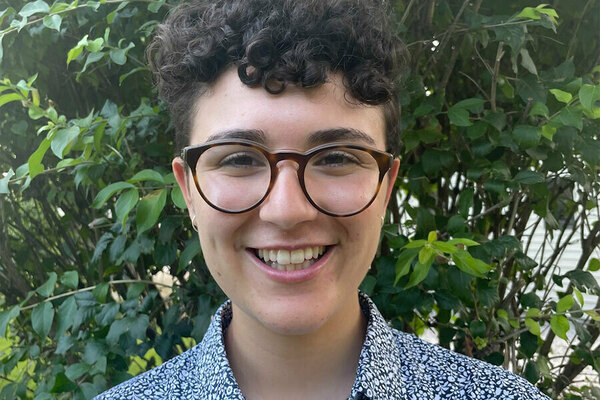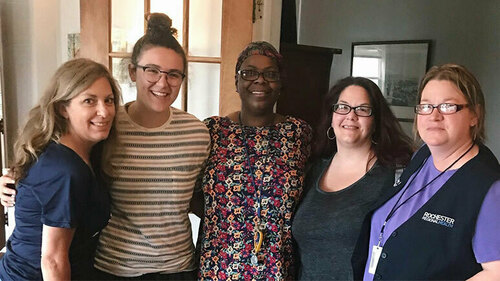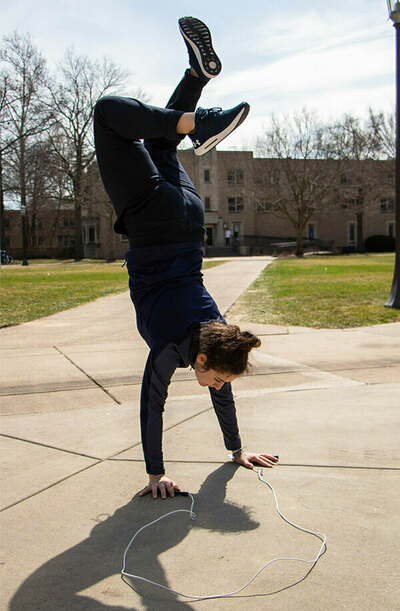
As an Arts & Letters undergraduate, Sam Ferraro is contemplating big ideas like the pursuit of social justice and human dignity — and developing concrete, sustainable solutions for communities in need.
And the Program of Liberal Studies and data science minor have enabled him to implement tangible strategies for organizations and communities from Appalachia to Guatemala.
“I believe in the common good, and I want to figure out my place in contributing to it,” Ferraro said. “Health is the overarching term that I can apply to all my experiences so far, whether that is environmental health, physical health, emotional health, or resilience.”
When he applied to Notre Dame, Ferraro intended to focus solely on physical health as a pre-medical student. But, by chance, he ended up talking with someone from a PLS information table while attending an event for admitted students.
“The more I learned about PLS, the more interesting it seemed,” he said. “The selling point for me was learning how to think and not what to think. That seemed like a really exciting way to approach education — for the sake of learning in itself.”
“PLS really has taught me how to think and not what to think — and data science is really similar in that you can approach the same problem in so many different ways. It’s learning how to use the toolbox in front of you in the best way possible to approach a problem that doesn’t have a predetermined outcome.”
A place for everyone
From the beginning, Ferraro has been fascinated by his coursework and felt at home in the PLS community. He thrives on the dialogue and debates in PLS classes and is energized by the diversity of opinions on the readings shared in the classroom.

After volunteering at a women’s shelter in Rochester, New York, as part of a Summer Service Learning Program through the Center for Social Concerns after his first year, Ferraro realized he also wanted to add a more technical component to his education.
“I loved every part of that experience. It was very human-oriented, and I really admired the leaders there who were able to manage both people and the technical side of running a nonprofit,” Ferraro said. “So I wanted to gain more technical skills as I discerned my future career path, too.”
After speaking with a student minoring in data science and learning about the versatility of the program, Ferraro enrolled in an introductory class. He was immediately sold on the coursework and the new skills he could apply to any of his interests.
“PLS can be very abstract and theoretical, which I love and feel comfortable in, but it’s really interesting to balance that with a very technical minor like data science that introduces you to different coding languages and skills,” Ferraro said.
There is a place for everyone in data science — from those who are very mathematically minded to those who flourish in visual arts— Ferraro said. Data must be collected, analyzed, and presented, creating a whole range of jobs within data science from data engineering to data storytelling.
“Data science is extremely interdisciplinary. It’s a space for all different fields to come together in varying degrees of complexity, and there are different parts of the workflow where you can find yourself,” Ferraro said. “The professors in the data science minor are really phenomenal and supportive. They help you find your niche in the workflow.”
Real-world resolutions
The summer after junior year, Ferraro had two opportunities to use data science skills and PLS skills together to address real-world problems.

While working virtually as a conservation intern for Coalfield Development, an organization in West Virginia dedicated to revitalizing the Appalachian economy, Ferraro developed a system to track sustainability metrics across the company to improve its resource usage.
Ferraro also partnered virtually with Soluciones Comunitarias to develop a resilience strategy for rural organizations in Guatemala to help them adapt to the challenges of the pandemic.
“In both my experiences, I felt that I was pulling from a lot of what I’ve learned in PLS,” Ferraro said. “Conversing with a team felt very similar to the classroom where you’re talking to work through a problem or a difficult task in front of you without one predetermined outcome. I was also able to apply my data science skills to offer another layer to our strategies.”
While learning for Ferraro is an end in itself, his major and minor have become important tools in his search for solutions to larger issues like environmental sustainability and the resiliency of local economies.
“PLS really has taught me how to think and not what to think — and data science is really similar in that you can approach the same problem in so many different ways,” Ferraro said. “It’s learning how to use the toolbox in front of you in the best way possible to approach a problem that doesn’t have a predetermined outcome.”
‘Everything connects’
This summer, Ferraro applied his skills to a new challenge as a health and benefits consulting intern for Willis Towers Watson in Chicago. The position involved working with colleagues to support clients on health and benefit plans to improve employee health outcomes through an integrated wellbeing lens.
After Notre Dame, Ferraro is considering further pursuing consulting or attending graduate school.
“You can really go anywhere with an Arts & Letters education, and that’s really valuable,” Ferraro said. “Everything in Arts & Letters continues to build on itself, so everything connects. I’m excited to see how it continues to connect in the future in my career and experiences.”
“You can really go anywhere with an Arts & Letters education, and that’s really valuable. Everything in Arts & Letters continues to build on itself, so everything connects. I’m excited to see how it continues to connect in the future in my career and experiences.”
Originally published by at al.nd.edu on August 25, 2021.